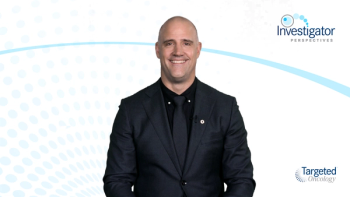
Idelalisib + Rituximab in Previously Treated CLL Patients
Review of a phase III trial of idelalisib + rituximab in previously treated patients with chronic lymphocytic leukemia (CLL).
Episodes in this series

Andrew Zelenetz, MD: A lot of people ask, “Is adding the anti-CD20 important?” This is actually the way the study was done. There was a second study done in low-grade lymphomas that included small lymphocytic lymphoma, which was idelalisib monotherapy. Actually, there were very high response rates in the patients with small lymphocytic lymphoma, which is a lymphomatosis form of CLL [chronic lymphocytic leukemia]. It’s not clear that the anti-CD20 antibody is essential to combine with idelalisib. How many people use the combination? Because that’s actually how it’s FDA approved for the management of relapsed and refractory CLL.
What are some of the alternatives? There are alternatives. If one doesn’t want to switch to an alternative BTK [bruton tyrosine kinase] inhibitor, we have the results of the MURANO trial. That it was a combination of rituximab and venetoclax. The rituximab is given for 6 months, and venetoclax is given for 2 years. This is a situation therapy and a highly effective therapy because you are not treating to resistance. There’s the potential to reuse venetoclax, because there’s evidence of disease progression. Other options include investigational PI3 kinase inhibitors that have reduced toxicity, including parsaclisib, zandelisib, and umbralisib. All seem to have very high activity in CLL, but for CLL these are all investigational agents and are available only in the city of a clinical trial.
This transcript has been edited for clarity.
Case: A 77-Year-Old Man With Chronic Lymphocytic Leukemia
Initial Presentation
- A 77-year-old man presented to urgent care reporting worsening fatigue accompanied by persistent, unexplained fevers and night sweats over the past few weeks and unintentional 12-lb weight loss over the past 6 months
- PMH: HTN, medically controlled; BPH; OA in spine and hips
- PE: palpable cervical, axillary, and right-sided inguinal lymphadenopathy
Clinical Workup
- Labs: WBC 49,000, lymphocyte 74%, ANC 3700/mm3, Hb 9.2 g/dL, PLT 90 x 109/L, LDH 240 U/L, B2M 4.1 mg/L
- FC: CD 5+, CD23+, CD20+ monoclonal B-cell population; confirmed diagnosis of CLL
Hem/Onc Workup
- Mutation testing: IGHV unmutated; FISH: positive for del(11q)
- Rai stage IV; Binet stage C
- ECOG PS 1
Treatment
- Started on treatment with ibrutinib 420 mg PO QD; his symptoms improved and he achieved partial response
- 3 months into treatment he returned to urgent care reporting SOB, pain in his chest, confusion, and anxiety; he was convinced he was having a heart attack
- Work-up revealed treatment-related atrial fibrillation
- Situation was explained to the patient and he was offered medication and monitoring but preferred to change to a different medication out of concern for this happening again or worsening
- Labs were repeated
- Treatment was initiated with idelalisib 150 mg PO BID + rituximab










































